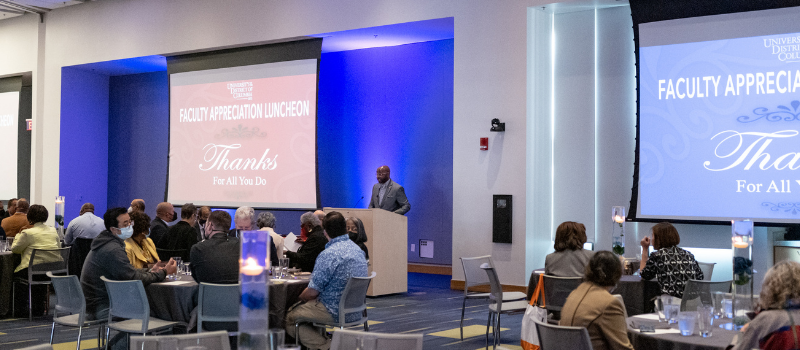
2022 Faculty Excellence Awards recognize educators’ brilliance and leadership
2022 Faculty Excellence Awards recognize educators’ brilliance and leadership
The UDC Faculty Excellence Awards recognizes the outstanding achievements and accomplishments of faculty in four categories: Faculty Excellence in Service, Scholarly/Creative Works, Teaching and External Funding. Faculty honorees were selected by the Executive Cabinet and were recognized during the Faculty Appreciation Luncheon and presented with a $1,000 check. In this issue of UDC Forward, we are pleased to share more about these accomplishments and what these awards mean to the recipients.
2022 Faculty Excellence Award in Service
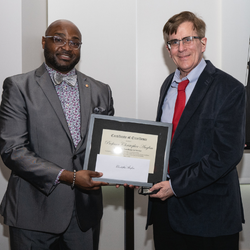
Professor Christopher Anglim (Learning Resources Division – LRD)
What does this award mean to you?
I am so very honored and humbled to receive this award. In my 15½ years of working here, I have enjoyed contributing to the betterment of our community. While there are numerous ways one can serve at the University, I count faculty service among the great service opportunities of my lifetime.
What does working at UDC mean to you?
I perceive my work at UDC as a special calling because it is an incredibly special place that helps its students further their dreams, aspirations and goals every day. As a librarian and an archivist, I have the joy of helping library researchers find the information they seek and even information they need but did not even know exists. I enjoy connecting researchers with relevant information, which helps them create new knowledge, and helps to develop strong and informed researchers that develop and build a better society. Through our labors, the tools of information we use, and our service orientation, we contribute to building a better, most just, more sustainable and more equitable society for all humanity.
What are your near-future plans in terms of work goals?
There is much on my agenda. As the University Archivist, I will continue to work to place as much of our collection online as possible for users to freely access anywhere that they have an Internet connection. With regards to Archives, I will seek to introduce new programs, and new ways to make the University Archives more accessible, ensure its preservation and access to UDC’s historical legacy.
What does service mean to you?
The lesson of being intensely dedicated to serving the community is one that I learned from my teachers, my church, and the civic organizations that I have been a part of over several years. Most importantly, I have learned the importance of service from my parents. My mother was a professor of nursing at a university and active in the American Cancer Society and professional organizations in nursing. My father worked for social agencies in county government and was active in the church. Both parents stressed the need to care for those less fortunate, those in need, and those who are oppressed; and that the good in doing such service is the best reward that anyone could possibly receive.
2022 Faculty Excellence Award in Scholarly/Creative Works
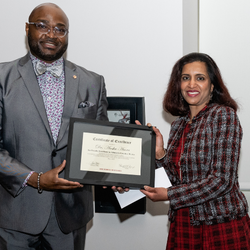
Dr. Anshu Arora (School of Business & Public Administration)
What does this award mean to you?
This prestigious award means a lot to me in terms of acclaim and achievement in an emerging, interdisciplinary, STEM-Business-Social Sciences area of Social-Ethical-Collaborative Robotics, Artificial Intelligence (AI), Human-Robot Interaction (HRI), Social-Behavioral Cognition and Motivation, and Autism Spectrum Disorder (ASD) and other cognitive/learning disorders and disabilities. My current NSF-Funded “Social Motivation Approach for Rehabilitation Through Educational Robotics (SMARTER) research” focuses on creating interdisciplinary knowledge and skills through social-educational robotics, and targets cognitive rehabilitation in students diagnosed with learning/cognitive disabilities, social interaction difficulties and developmental disorders (e.g., Autism Spectrum Disorder or ASD) in the District of Columbia Public Schools (DCPS) and the University of the District of Columbia (UDC) in Washington, D.C.
This award inspires me to keep exploring and researching areas where not enough research is done, and where research (in the unknown) can help develop future research implications.
What does working at UDC mean to you?
The University of the District of Columbia (UDC) holds a very special place in my life with UDC being my workplace, a place where careers are made, a place where we have change agents, mentors and leaders, and a place that provides a high-quality education and enriches the lives of students and stakeholders alike. I enjoy what I do every day. Teaching is my passion, and I research in the areas I teach. UDC provides me with a unique opportunity to impact students’ lives by ensuring that they learn collaboratively, explore their passions, and are rewarded with effective research and educational opportunities. I truly believe in the UDC motto – Aspire. Accomplish. Take on the World.
What are your near-future plans in terms of work goals?
I would love to continue working in the area Social-Ethical-Collaborative Robotics, and how social robots can positively impact ASD students for cognitive rehabilitation through robotic interventions and interactions. I plan to strive towards creating interdisciplinary knowledge and skills in the field of educational-social, ethical, and cross-cultural robotics through robotic interventions targeting learning disabilities and disorders. When my UDC undergraduate and graduate student researchers are engaged in these HRI experiments and robotic interventions with high schoolers diagnosed with autism over time, I strongly feel that these UDC students (and myself) have become more empathetic and the HRI experiments positively change/impact our life-perspectives.
What else can you tell us about UDC’s Social Robotics Research?
A complete synopsis of the Social Robotics Research happening at UDC can be found at https://www.udc.edu/sbpa/lit/social-robotics-research/
2022 Faculty Excellence Award in Teaching
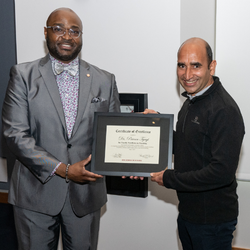
Dr. Pawan Tyagi (School of Engineering & Applied Sciences)
What does this award mean to you?
The 2022 Faculty Excellence Award in Teaching is awarded based on my innovation in teaching method. This award suggests that UDC leadership care and value innovation in teaching such as Student Presentation based Effective Teaching (SPET). I invented SPET eight years ago and improved the SPET approach to meet the need of diverse students, small and big classes, online teaching during COVID-19 impacted period, and for busy engineering faculty across the globe who spent significant time in laboratory research and have less time for student-centered teaching. For the first time, I established UDC leadership in utilizing SPET as a practical and effective platform for teaching human potential enhancing methods (positive intelligence or emotional intelligence) to engineering undergraduates and graduate students and presented my findings at a workshop at Stanford University and in many international conferences. Receiving the Teaching Excellence award this year shows me that UDC values such high impact activities. I do hope this recognition has inspired many other UDC faculty and especially engineering faculty to continue innovation in teaching. It is noteworthy that in the engineering discipline a major career focus remains on laboratory innovation and scientific discoveries. Discoveries in teaching is still an unusual direction and I hope such recognition underscores UDC’s focus on excellence in teaching.
What does working at UDC mean to you?
Working at UDC means unleashing my full potential as a discoverer. So, working at UDC means freedom to me. I am grateful to UDC and our encouraging administration for giving me a platform to do innovation in almost every segment of my professional life. UDC created opportunities for me to get advanced training in teaching from world leaders in education. My training in state-of-the-art teaching and learning during two Myrtilla Miner Faculty fellowships in 2012 and 2015 gave me the tools and skills to develop the SPET method for which I was awarded the 2012 Teaching Excellence award. I must also say that UDC has also given me a platform and freedom to bring in $10 million in federal funding to promote undergraduate and PhD-level training via cutting edge innovative engineering research. In 2019, UDC also awarded me for Excellence in bringing External Funding. Working at UDC gave me freedom and resources to excel in innovation classroom teaching via SPET and using scientific innovations as tools for experiential learning for UDC undergraduate to Ph.D. level students.
What are your near-future plans in terms of work goals?
I have three visions about my work at UDC:
(1) Develop tools and technology to diagnose and rectify human psychological barriers to unleash their full potential. I believe conquering our own limiting habits and ego is the ultimate frontier to gain full freedom to be a human. Without that no matter what great teaching we do and how much sophisticated laboratories we provide the learning and teaching will never reach its ultimate level.
(2) I am engaged in nanotechnology research and striving to make my humble contribution in next generation advanced computers, solar cells, and biomedical sensors. I have led several patented technologies and more than 60 peer reviewed publications. My next plan is to utilize the NSF-CREST Center and NNSA funded consortium to enable myself and other faculty to make all the aspiring students become discoverer in some aspects of science and technology. Being a discover and proving one’s skill via scientific publications and conferences is an irrefutable way to establish quality of our diverse–especially underrepresented DC students. Getting a proven status of discoverer will lend them to career opportunities that are available to students from Ivy league and research institutions. My personnel vision and efforts are in line with UDC foundational and core mission as an HBCU.
(3) UDC Technology Innovation Center: Being an innovator, I see a strong need to develop and commercialize technologies from UDC. My plan is to create innovative patentable technologies and mature them to the point of actual commercialization. Such efforts can bring financial support for UDC, faculty, and most importantly will give more resources, projects, and motivation to our students. Generating sustainable innovation driven funding stream may enable UDC to sail through unpredictable times such as COVID-19 pandemic.
How can we learn more about research at UDC?
I serve as director of the Center for Nanotechnology Research and Education. Take a look at the links below to learn more about the outstanding teaching and research by our faculty and students.
2022 Faculty Excellence Award for External Funding
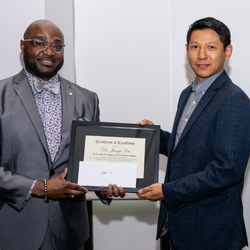
Dr. JiaJun Xu (School of Engineering & Applied Sciences)
What does this award mean to you?
First off, I could not have received this award all on my own. Success isn’t achieved independently; success can only be achieved with the help and support of peers. I would not be where I am today without the support of the UDC team. Success takes a village. To me, this award was a way to say thank you and to honor all of those who have helped get me where I am today.
Receiving this award has energized me to do more, to continue to reach for the stars, and to set my eyes on my next goal. It also means I have an obligation to continue to learn and grow within my professional development, and more importantly, to continue mentoring the younger generation through my career and showing them the infinite possibility of pursuing STEM education and career pathway.
What does working at UDC mean to you?
Working at UDC means a lot to me. I joined UDC right after I received my Ph.D. in Mechanical Engineering. UDC has provided me with unique opportunities to not only thrive in my core research but also expand my research interests and collaborate with my peers on other areas including advanced manufacturing, nanotechnology and machine learning. UDC has given me the opportunity to initiate and develop cutting-edge research laboratories and use them to engage students with disadvantaged backgrounds from UDC and the broader community at the nation’s capital.
What are your near-future plans as far as your work goes?
My near-future plans include continuing to work with my peers and to seek and secure more external funding which we can use to support the ever-growing needs of STEM educational and research activities at UDC. Based upon existing funded projects, I plan to expand my collaborations with researchers at UDC and UDC-Community College to better support the initiatives outlined in UDC’s Equity Imperative Strategic Plan.
Anything else you’d like to share?
I would really like to take this opportunity to thank my colleagues and SEAS leadership, especially Dean Devdas Shetty for his mentorship, encouragement, and support since I joined UDC. I want to say “thank you” to UDC leadership including President Mason, Dr. Potter and Dr. McCrary for their support in providing the encouraging environment for faculty research and scholarship. Last but not least, I want to thank my current and graduated students and center staff members for their hard work and dedication to excellence.